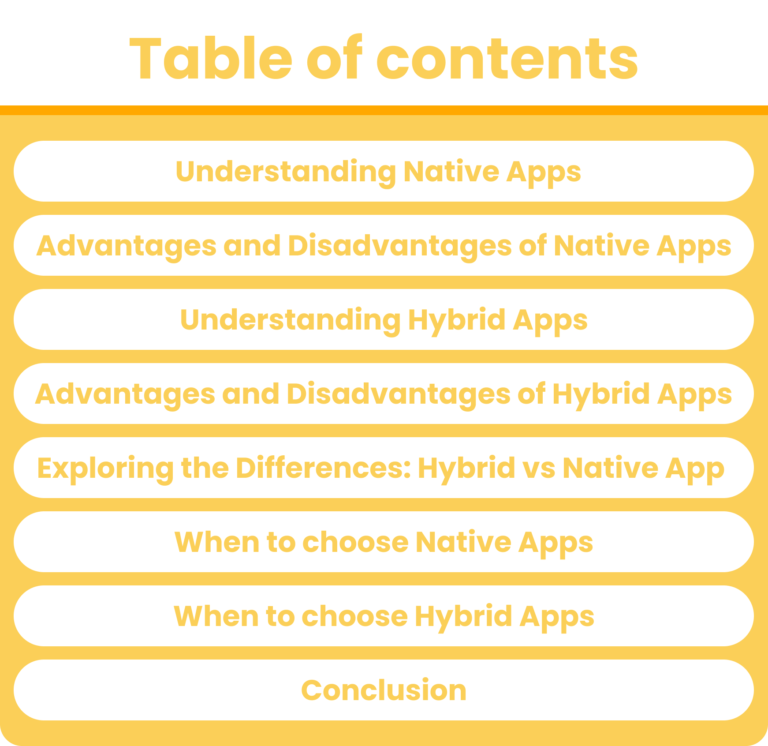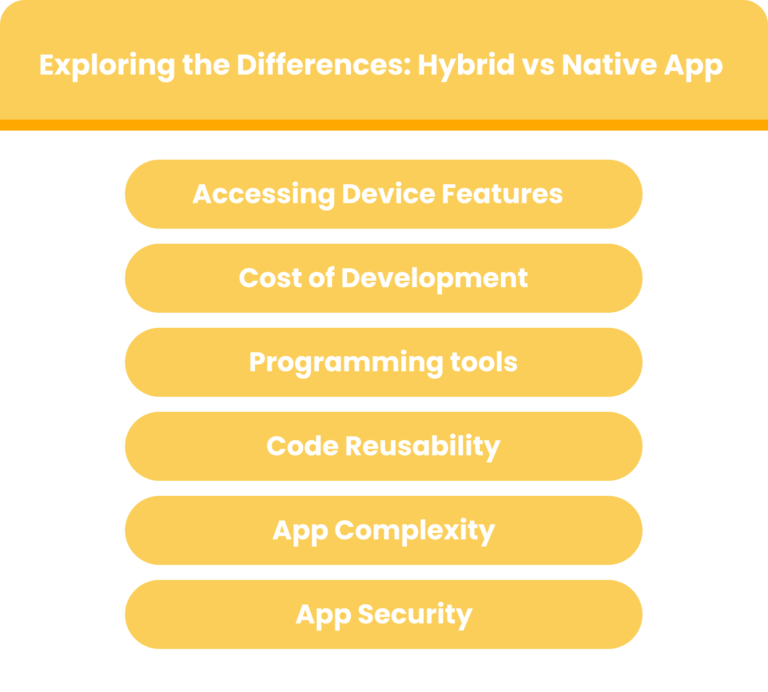Mobile apps are super handy tools for businesses. They’re like your go-to for everything from banking to shopping and entertainment. People love them because they’re quick and easy to use. That’s why businesses are all about apps nowadays. In fact, they’re becoming more popular than ever before! Did you know there are expected to be a whopping 299 billion app downloads?
But here’s the thing: developing a mobile app isn’t all fun and games. It comes with its own set of challenges. Take, for example, the hybrid vs native apps debate. Should you make an app specifically for one platform, or go for something that works on multiple platforms?
As a mobile app development company we’re constantly exploring the best options for you. Let’s break down the difference between hybrid vs native apps and see which one is best for you.

Understanding Native Apps
The debate between native vs hybrid apps, let us understand about the native apps. Native app development involves creating applications specifically designed to work on a particular mobile operating system, such as Android or iOS. This process typically involves using programming languages like Java for Kotlin for Android and Swift or Objective-C for iOS. These apps are built within a secure environment that follows the technical guidelines and user experience standards set by the respective operating system.
As a result, native apps offer faster performance and a more seamless user experience, as they look and feel consistent with other apps on the device. Additionally, native apps have the advantage of being able to easily access and utilize the device’s features, such as the camera, GPS, and address book. Overall, native app development ensures that apps are optimized for the specific platform they are intended for, providing users with a reliable and efficient mobile experience.
Example : WhatsApp, Spotify, SoundCloud etc.
Advantages and Disadvantages of Native Apps
Advantages of Native Apps
1) Familiar User Experience
Native Apps have a familiar appearance and feel, similar to the device’s default applications, enhancing the user experience.
2) Quick Loading Time
They load quickly because they are specifically designed for the platform they run on.
3) Offline Functionality
Native apps perform well even when offline, allowing users to access fundamental functions without an internet connection.
4) Excellent Performance
Due to their use of native code, they offer excellent performance, particularly for graphic-intensive apps, high-definition games, and those with heavy animation.
Disadvantages of Native Apps
1) Higher Development Costs
Developing native apps costs more because different developers with specific skills are needed for each platform, increasing overall expenses.
2) Limited Compatibility Across Platforms
Native apps are tailored for specific platforms like iOS or Android, restricting their compatibility across different systems. Creating separate versions for each platform is time-consuming and expensive, limiting audience reach. Maintaining and updating multiple versions can also pose challenges for developers.
3) Complexity of Releasing Identical Features
Releasing identical features across all platforms is complex and time-consuming due to the unique codebase of native apps.
Understanding Hybrid Apps
Hybrid apps are like a mix of websites and native apps. They’re built using web technologies like JavaScript and HTML, but they act like regular apps. When you use a hybrid app, it mostly loads content from a website. One of the key advantages of hybrid apps is their ability to leverage native plugins, enabling them to access device features such as the camera, file storage, and security features like fingerprint recognition or Face ID. This allows hybrid apps to offer a seamless user experience similar to native apps, without requiring additional coding for each platform.
Hybrid app development offers a compelling solution for businesses looking to create cross-platform applications that combine the flexibility of web technologies with the performance and functionality of native apps.
Example : Instagram, Twitter, Uber etc.
Advantages and Disadvantages of Hybrid Apps
Advantages of Hybrid Apps
1) Cost-Effectiveness
Hybrid apps offer a cost-effective solution by allowing developers to create one application that works across multiple platforms, saving time and money.
2) Consistent User Experience Across Platforms
Users can enjoy a consistent experience regardless of the device, browser, or operating system they use, as hybrid apps provide similar user experiences across all platforms.
3) Single Codebase for Multiple Platforms
Developers only need to write the code once for a hybrid app, which can then be used across different platforms, reducing the need to develop and maintain separate versions for each platform.
4) Hardware-Based Performance
Hybrid apps can achieve hardware-based performance similar to native apps, providing a smooth user experience across all devices.
Disadvantages of Hybrid Apps
1) Performance Considerations
While many applications perform similarly whether they are hybrid or native, high-performance apps like HD games or data-intensive software may not function well as hybrid apps.
2) User Experience Variability
Each user’s experience with a hybrid app can vary due to differences in software, operating system, and device version. This variability requires extensive testing to ensure consistency.
3) Dependency on Native Plugins
Hybrid apps rely on native plugins for certain functionalities, but accessing new device features may not always be straightforward. Creating custom plugins can add complexity to the development process.
Exploring the Differences: Hybrid vs Native App

1) Accessing Device Features :
Between the native vs hybrid apps the native apps have full access to device features through platform-specific SDKs, while hybrid apps have limited access based on the chosen development tool.
2) Cost of Development :
Native app development is more expensive since separate apps need to be built for each platform, whereas hybrid apps are more cost-effective due to their cross-platform compatibility.
3) Programming tools :
For native development, developers use Java/Kotlin for Android and Swift/Objective-C for iOS, while hybrid development involves frameworks like Ionic Framework, Flutter, Cordova, React Native, Xamarin, NativeScript etc.
4) Code Reusability :
Native app code for one platform cannot be reused for others, while hybrid app code can be ported to multiple platforms with ease.
5) App Complexity :
Native apps are typically more complex to build, while hybrid apps are simpler and moderately complex.
6) App Security :
Native apps generally offer higher security, whereas hybrid apps may have slightly lower security measures.
When to choose Native Apps
Native app development is the best choice when :
1) High Performance Requirements:
If your application demands high performance and responsiveness, especially for tasks like gaming or multimedia, native apps are the way to go.
2) Platform-Specific Features:
When you need access to platform-specific features and functionalities, such as GPS, camera, or push notifications, native development provides seamless integration with the device’s capabilities.
3) Enhanced User Experience:
Native apps offer a superior user experience by adhering to platform-specific design guidelines, resulting in higher engagement and satisfaction among users.
4) Long-Term Scalability:
Investing in native app development ensures long-term scalability and compatibility with future platform updates, providing a robust foundation for future enhancements and optimizations.
5) Brand Credibility:
Native apps often convey a sense of reliability and professionalism, enhancing your brand’s credibility and trustworthiness among users.
In these situations, choosing native app development ensures that your app performs efficiently, provides a seamless user experience, and meets the specific requirements of your business.
When to choose Hybrid Apps
Hybrid app development is the best choice when :
1) Quick Testing:
Hybrid apps are good for testing ideas fast across different devices.
2) Cost-effective:
They save money by using one codebase for many platforms.
3) Works Everywhere:
Hybrid apps run on various devices and systems.
4) Fewer Features Needed:
If your app doesn’t need many special features, hybrids are fine.
5) Easy Updates:
It’s simple to update and maintain hybrid apps.
6) Faster Launch:
With hybrid tools like React Native, apps launch quickly.
In these situations, hybrid app development offers a cost-effective and efficient way to bring your app to market quickly while still meeting your business needs.
Conclusion
Native and hybrid app development approaches each have their own set of advantages and disadvantages, and choosing between them requires careful consideration of various factors. Hybrid apps offer the advantage of quicker testing and launching of app concepts at a lower cost.
On the other hand, native apps are tailored specifically for their respective operating systems, providing benefits such as enhanced security, highly responsive user interfaces, superior performance, and access to native APIs. Despite potentially higher initial investment costs, native apps often prove to be more cost-effective and time-saving in the long run, delivering superior performance and user experiences.
